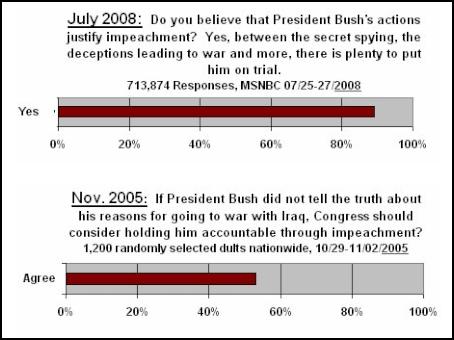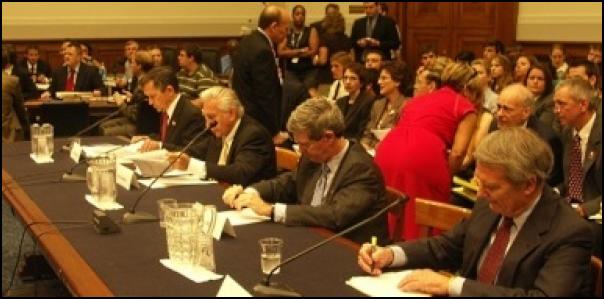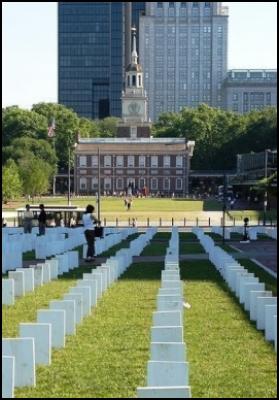The People, the Press, and the Case for Impeachment

Support for impeachment in the past and on the hearing date. MSNBC, Zogby
House Justice Committee Hears Kucinich Resolution - Part 2
"When our founding fathers signed the Declaration of Independence they were not worried about political will, how much time there was, or about any parties' political future, they were just worried they were going to be hanged by the neck. But they did what was right. Now it is your time."
Elliott Adams, President, Veterans for Peace, testimony July 25, 2008
"Scoop" Independent News
Washington, DC (See Part 1)
The July 25, 2008 House Committee on the Judiciary hearings focused on the Kucinich resolution calling for the impeachment of President Bush. In his resolution, Rep. Dennis Kucinich (D-OH) argues that Bush knew that the Iraqis had no weapons of mass destruction, yet claimed that they did in order to justify the March 2003 invasion. The "fraudulent misrepresentations," as they're referred to in the resolution, cost lives, compromised national security, and represented a clear abuse of constitutional power. The evidence supporting these claims is highly persuasive.

Click for big version
Congressional witnesses review their critique of the president. Representatives
Kucinich (D-OH), Hinchey (D-NY), Miller (D-NC), and Jones (R-NC) Image: M. Collins
For the most part, the witness statements from House members and the panel of invited witnesses contain specific justifications for impeachment. The Kucinich resolution for impeachment, H. Res 1345, offers a concentrated body of evidence substantiating the charges and demonstrates the main charge in the resolution: the president knew that he was misrepresenting the facts about Iraq at the time he was doing it.
In the resolution, Rep. Kucinich lists corrections for each of the false assertions made by the president to justify the Iraq invasion. In addition, the resolution provides excerpted evidence and sources to support each correction of the president's fabricated rationale.
The statements in single quotes in the Kucinich resolution text below are from the president's justifications for war. From the resolution:
1. Iraq was not 'continuing to possess and develop a significant chemical and biological weapons capability.'2. Iraq was not 'actively seeking a nuclear weapons capability.'
3. Iraq was not 'continuing to threaten the national security interests of the United States.'
4. Iraq did not have the 'willingness to attack, the United States.'
5. Iraq had no connection with the attacks of 9/11 or with al-Qaida's role in 9/11.
6. Iraq possessed no weapons of mass destruction to transfer to anyone.
7. Iraq had no weapons of mass destruction and therefore had no capability of launching a surprise attack against the United States or its Armed Forces or to provide them to international terrorists who would do so.
8. There was not a real risk of an 'extreme magnitude of harm that would result to the United States and its citizens from such an attack' because Iraq had no capability of attacking the United States.
9. The aforementioned evidence did not 'justify the use of force by the United States to defend itself' because Iraq did not have weapons of mass destruction, or have the intention or capability of using the nonexistent WMDs against the United States.
10. Since there was no threat posed by Iraq to the United States, the enactment clause of the Senate Joint Resolution 45 was predicated on misstatements to Congress. H. Res. 1345 (alternate link)
The facts from that time don't come close to justifying the use of force. As demonstrated in the resolution, the president's case for war was based on "fraudulent representations made to Congress," the military, and the citizens of the United States.
See the draft of H. Res. 1345 at AfterDowingStreet.Org for direct links to the primary sources used in the resolution. The Library of Congress (THOMAS) and this alternate site have the official versions of the resolution, modified somewhat from the draft.
This information and more has been known for years to many citizens, particularly those who actively work for the impeachment of Bush and Cheney. Hundreds of them waited hours to get a seat in the public hearing which accommodated less than twenty of those who had waited in line.
Citizens Share Their Wisdom - 5:00 am Early Responders on Capitol Hill
As it turned out, the earliest arrivals for the hearings were from the key states responsible for the Declaration of Independence and United States Constitution, Virginia and Massachusetts, and the city in which they were developed, debated, and adopted, Philadelphia, Pennsylvania.
Bill Perry and Sam Adams, two of the several representatives from Philadelphia's Delaware Valley Veterans for America, were on also present just before 5:00 am, as well. Perry and Adams, Viet Nam veterans had just worked on "A Sea of Tombstones: The Cost of War" mourning the Iraq war dead. When asked about claims that impeachment might hurt national security, Perry said clearly, "We are national security" and pointed out that the war makes us more rather than less vulnerable as a nation. Adams was clear on the necessity for impeachment: "We have to do it so the next guy down the road won't do the same thing."

Image: Jack Semper Fi Kline
Philadelphia's Delaware Valley Veterans for America "A Sea of Tombstones" memorial to U.S. soldiers lost in Iraq. Independence Hall is in the background. It was the nation's capitol for a time during the revolution and the building in which both the Declaration of Independence and U.S. Constitution were debated. The Liberty Bell is located nearby.
Rain Burroughs, Mary Genther-Carter, and Chris Dorsey of RVA4Peace got up very early and drove from Richmond, Virginia to Washington, DC for the impeachment hearings. They arrived before 5:00 am. When asked why impeach Bush this late in his term, Dorsey responded, "It's never too late for accountability." Burroughs had a special point to make by attending the hearings. Along with her seven year old daughter, she'd been removed from a 2007 Fourth of July celebration by Richmond police for displaying a sign containing the word "Impeach." Genther-Carter was just glad to be there even though she needed to be back in Richmond for work in mid afternoon.
David Swanson, another Virginian, also arrived very early. Swanson has been a constant advocate for White House accountability, impeachment, and an end to the occupation of Iraq. As the head of AfterDowningStreet.Org, he provides and hosts much of the key information on the hearings, including videos of the July 25 hearings.
When asked what he'd say to those who said this is too late and a waste of time, Swanson was quick to respond stating that there are "many reasons why that's absolute nonsense." He pointed to the overwhelming proof that the reasons for the Iraq invasion were fabricated, the undeniable admissions concerning FISA violations, and asked, "What's this second to?" Swanson also pointed out that there's no need for a prolonged impeachment process since the proof is already in place and widely available.
Robert Feuer from Stockbridge, Massachusetts, made a point of arriving early to the impeachment hearing line. He's campaigning hard against incumbent Rep. John Oliver (D-MA) in the Democratic primary for the Massachusetts 1st congressional district. A small town lawyer, Feuer is outraged that his representative has ignored the will of the people expressed at town hall meetings across the district. Oliver, he reports, admits that he's fully aware that many towns have voted in favor of impeachment by huge margins but refuses to support the effort. Feuer hopes to replace Oliver and solve at least that problem.
It would have been impossible to keep Stuart Hutchison out of the capitol on the day of the hearings. He founded North Jersey Impeach Groups, one of the most active impeachment organizations in the country. He outlined his motivation for impeachment in no uncertain terms:
"The biggest threat to the security of the United States is not Osama bin Laden. The most severe threat's not Iran or Musharraf or the Taliban in Afghanistan, and it's not al-Qaeda. None of these has the power to defeat the United States, not one can undo American democracy. The USA does suffer a grave threat to its security, a clear and present danger to the future of every person in our country, and it's led by Dick Cheney, George Bush, and the gang they put together who overthrew the government of the United States in November 2000."
Press Coverage - General Indifference and Tepid Denial by the Dwindling Elite
The mainstream media continued to lag far behind everyday citizens by ignoring the big issues while ridiculing those who take the lead in addressing vital concerns.
Class Clown Dana Milbank of the Washington Post
Dana Milbank successfully defended his title as class clown of the Washington press corps in a column that was so divorced from reality one wonders if he even attended or watched the hearings. He began with this:
"It seems that we are hosting an anger management class," Republican Rep. Lamar Smith of Texas told his colleagues on the House Judiciary Committee yesterday morning."He had a point." Washington Post, July 26, 2008
He continued by endorsing Republican committee member wise cracks and disparaging Chairman John Conyers'(D-OH) handling of the event.
Milbank wrote a 2005 hit piece on Conyers in which he mocked the hearings held by the Michigan Democrat on the Downing Street Memo. Labeled "Secret and Personal - for UK Eyes," the July, 2002 secret report by a British foreign policy aid described meetings with Bush-Cheney representatives which included plans for war based on political not security reasons.
"Bush wanted to remove Saddam, through military action, justified by the conjunction of terrorism and WMD. But the intelligence and facts were being fixed around the policy."It seemed clear that Bush had made up his mind to take military action, even if the timing was not yet decided. But the case was thin.
Matthew Rycroft, July 23, 2002, reported in the London TimesOnline, May 1, 2005
Milbank failed to note the tens of thousands of deaths and injuries suffered by U.S. soldiers. He missed the 1.0 million plus dead Iraqi civilians resulting from the civil strife caused by the invasion. And one wonders if he even knew about the 5.0 million Iraqi children orphaned by the war.
These highly relevant facts were an inconvenience to Milbank who brushed them aside for his humorous approach to the national tragedy enabled by gross violations of the Constitution and a total lack of common decency. The facts are also more than inconvenient for the paper that supports his tasteless humor, the Washington Post, which has so faithfully supported the aggressive and violent foreign policy.
Maybe Milbank and his editor should read their own poll on the public assessment of their man: "Nearly 6 in 10 -- 58 percent -- said they have doubts about Bush's honesty, the first time in his presidency that more than half the country has questioned his personal integrity." Washington Post, Nov. 4, 2004
The Paper that thought Judith Miller fit to print - New York Times
The New York Times didn't think that the hearing was worth covering. A July 27 search of their news database, "newest first," resulted in nothing for "John Conyers, Jr." A similar search produced nothing since January 25, 2008 for "Kucinich." It's not hard to understand why The Times wants to avoid a hearing about "fraudulent representations" by the Bush, Cheney, etc. leading to death, destruction and national bankruptcy. They were full participants in the national disaster through their relentless barrage of propaganda offered up by their once star reporter, Judith Miller.
At least the Times had the decency to avoid the wildly inappropriate humor and flippant mockery that the Post endorsed from columnist Milbank.
Associated Press - Los Angeles Times
The AP article showed a degree of rationality until the reporter tipped his hand. After sparse coverage of the panel of distinguished witnesses, their choice for mockery by proxy emerged:
"One witness, law professor Jeremy Rabkin of George Mason University, said he was "astonished at the mood in this room.""The tone of these deliberations is slightly demented," Rabkin said.
"You should all remind yourselves that the rest of the country is not necessarily in this same bubble in which people think it is reasonable to describe the president as if he were Caligula." Associated Press, July 26, 2008
Did the Associated Press know that law professor and climate change skeptic Rabkin wrote an article called "Gitmo detainees are not ordinary felons" in which he minimizes abuse there and fails to mention extreme punishments and torture? We have to wonder if Rabkin ever read this or this about Guantanamo or looked at the photographs from Abu Ghraib.
The AP reporter chose to end the article with academic Rabkin's implication that supporting impeachment is the equivalent of seeing Bush "as if he were Caligula." Most members of a high school debate team would easily note that this statement involves at least two logical fallacies - "poisoning the well" and a "false dilemma." In addition, it's simply wrong. So much for AP sourcing.
From this review of the New York Times, Washington Post, and the Associated Press, it's clear that motivated citizens are more informed and generate much better analysis than the press.
The People Know
A clear majority of citizens knew that the war in Iraq was a bad idea from the start. In mid December 2002, a majority of Republicans and Democrats opposed an invasion prior to the completion of thorough weapons inspections. Citizens are clear that Bush is one of the very worst presidents in our history. They never did and never will abide by the viscous torture administered at the order of the Bush-Cheney zealots. And they're not likely to "close this chapter and move on" without a full investigation of the events leading to war and those responsible.
In fact, it's reasonable to predict that the majority of citizens will be adamant in their demands for answers to the following questions.
How were the White House and many in the top tier of the media able to spread "fraudulent misrepresentations" about Iraq?
Given the deliberate misrepresentations that justified the war, isn't the president directly responsible for the tens of thousands lost and injured U.S. soldiers and the over 1.0 million Iraqi citizens killed in civil strife? What responsibility do his subordinates and the enablers in the media bear for the deaths and injuries?
How can they justify a $3.0 trillion dollars for a war based on lies and who benefited?
How could the president and his supporters conduct a war against people who supposedly "hate our freedoms" by taking away those freedoms as quickly as possible? What motivation was there to remove fundamental constitutional guarantees?
How do citizens make sure that open hearings take place and that justice follows?
The July 25, 2008 congressional was just the beginning.
"The decision before us is whether to demand accountability for one of the gravest injustices imaginable."The decision before us is whether Congress will stand up to tell future Presidents that America has seen the last of these injustices, not the first.
"I believe the choice is clear.
"I ask this committee to think, and then to act, in order to enable this Congress to right a very great wrong and to hold accountable those who have misled this Nation."
The Honorable Dennis Kucinich (D-OH), July 25th, 2008
The citizens of the United States face the same challenge. Now it's our turn.
Note: Mr. Bugliosi used the figure of 100,000 dead U.S. soldiers and Iraqis. I use a much higher figure. Mr. Bugliosi is, no doubt, referring to official death count of the military plus the specific death reporting process operated by Iraq Body Count. This formalized process is the type of evidence better suited for a court of law. The 1.0 million plus dead Iraqi civilians comes from two surveys, one by Johns Hopkins School of Public Health and the other, a several times updated survey research project by the Opinion Research Business (ORB), a polling firm in Great Britain. These well executed survey research efforts are best used to understand the actual impact of the war. The two figures are not contradictory. They represent different levels of data gathering.
See AfterDowningStreet.Org for general impeachment resources and the House Committee on the Judiciary web site for this hearing. See the House database for the current copy of H. Res. 1345, the impeachment resolution and track it at GovTrack.us. See the hearings on video at AfterDowingStreet.Org.
*************


 Gordon Campbell: On Free Speech And Anti-Semitism
Gordon Campbell: On Free Speech And Anti-Semitism Ian Powell: The Disgrace Of The Hospice Care Funding Scandal
Ian Powell: The Disgrace Of The Hospice Care Funding Scandal Binoy Kampmark: Catching Israel Out - Gaza And The Madleen “Selfie” Protest
Binoy Kampmark: Catching Israel Out - Gaza And The Madleen “Selfie” Protest Ramzy Baroud: Gaza's 'Humanitarian' Façade - A Deceptive Ploy Unravels
Ramzy Baroud: Gaza's 'Humanitarian' Façade - A Deceptive Ploy Unravels Keith Rankin: Remembering New Zealand's Missing Tragedy
Keith Rankin: Remembering New Zealand's Missing Tragedy Gordon Campbell: On Why The Regulatory Standards Bill Should Be Dumped
Gordon Campbell: On Why The Regulatory Standards Bill Should Be Dumped